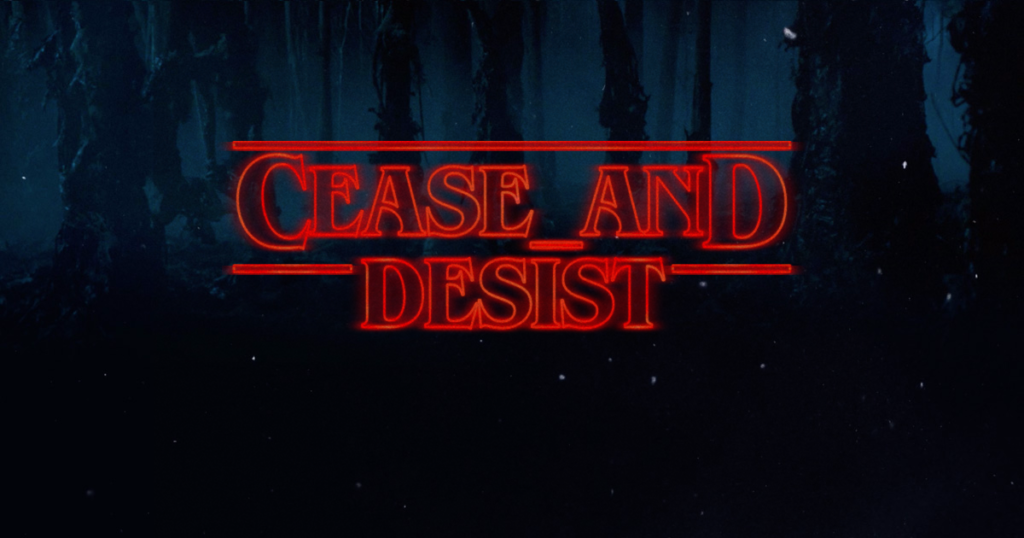
A Chicago venue decided to temporarily transform their event space into a ‘Stranger Things’ themed pop-up bar. According to their website, “The Upside Down bar concept will be the end of Summer 80’s dance party of your dreams, filled with curious Things inspired by & paying homage to the instant-classic television show. It brings you to the forefront of haunting happenings in Hawkins, Indiana & the brave kids of the Hawkins Middle School A.V. Club who saved their friend & their town from the devious deeds of the Hawkins National Laboratory & the subsequent devastation of the Demogorgon!”
The organizers, however, never gained permission from Netflix before opening this tribute to the beloved TV show and have now received a cease-and-desist letter. Cease-and-desist letters are commonly used when an individual or business wants to stop another person or organization from violating their legal rights.
Netflix shared their letter with DNAinfo, and it’s not your typical demand letter with the usual legal jargon. Instead, it stays consistent with its brand including characteristics and popular references of the show. The charming letter, via DNA Info, reads as follows:
“My walkie talkie is busted so I had to write this note instead. I heard you launched a Stranger Things pop-up bar at your Logan Square location. Look, I don’t want you to think I’m a total wastoid, and I love how much you guys love the show. (just wait until you see Season 2!) But unless I’m living in the Upside Down, I don’t think we did a deal with you for this pop-up. You’re obviously creative types, so I’m sure you can appreciate that it’s important to us to have a say in how our fans encounter the worlds we build.
We’re not going to go full Dr. Brenner on you, but we ask that you please (1) not extend the pop-up beyond its 6 week run ending in September and (2) reach out to us for permission if you plan to do something like this again. Let me know as soon as possible that you agree to these requests.
We love our fans more than anything, but you should know that the demogorgon is not always as forgiving. So please don’t make us call your mom.”
Netflix’s response to the unauthorized pop-up bar was a clever PR stint, but also an ingenious business move. The hit bar had already attracted a wave of free publicity for the show, and now this very distinct and very fan worthy cease-and-desist has generated even more buzz for the second season of ‘Stranger Things’.
IP is a tricky realm to navigate, but probably not as tricky as trekking through the Upside Down world! Creating a new endeavor around someone else’s intellectual property is a complicated project. It is imperative to work with the original IP holder as they own the rights and have the final say on what can and can’t be done to new experiences involving their intellectual property.
Importance of Cease-and-Desist Letters and Licensing
A cease-and-desist letter is often the first step to asking an individual, or a business, to stop engaging in unlawful and unwanted behavior, such as intellectual property infringement. The holder of an intellectual property right such as a copyrighted work, a trademark, or a patent, will send this to formally ask the recipient to immediately stop (“cease”) engaging in such behavior and no longer continue (“desist”) to engage in such behavior in the future. Otherwise, legal action will be taken because the behavior is harming or interfering with the sender’s legal rights. The letter may merely contain a licensing offer, or may be an explicit threat of a lawsuit. A cease-and-desist letter often triggers licensing negotiations, and is a frequent first step towards litigation.
Under Intellectual Property law, you have the exclusive right to use or reproduce your work. In some cases, you may wish to allow others to use it. In order to maintain control over and protect your intellectual property, a license agreement should be created. A license is a contract that allows you to make a profit by granting permission to another party to produce and sell goods, to use a trademark or patented technology, or to display work for a fee or other consideration. This is what the Chicago bar should have obtained from Netflix before indulging in the Stranger Things theme.

